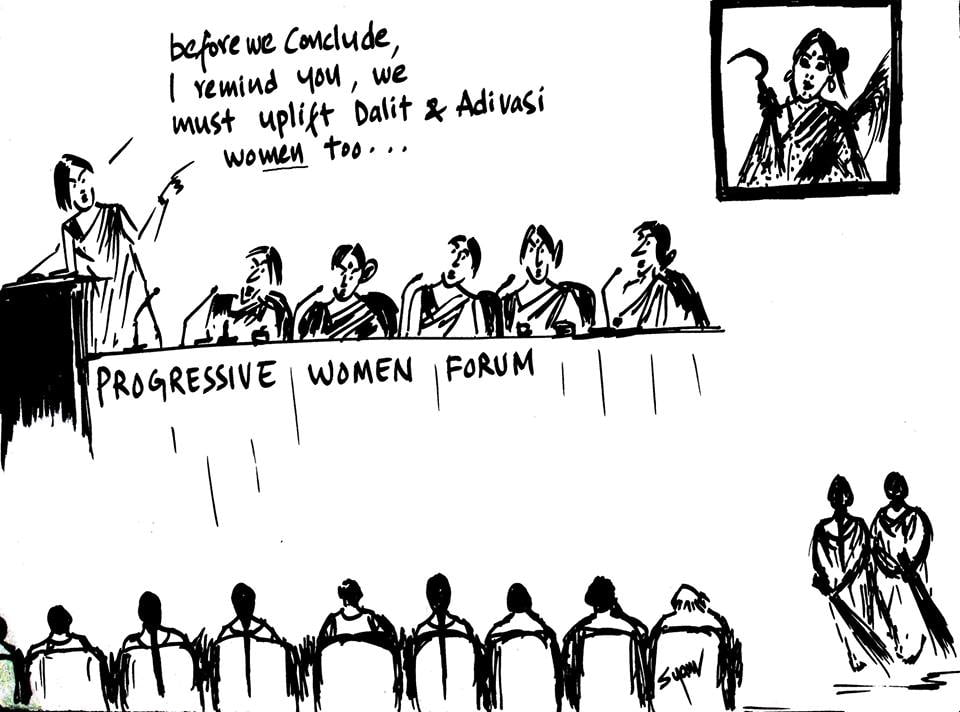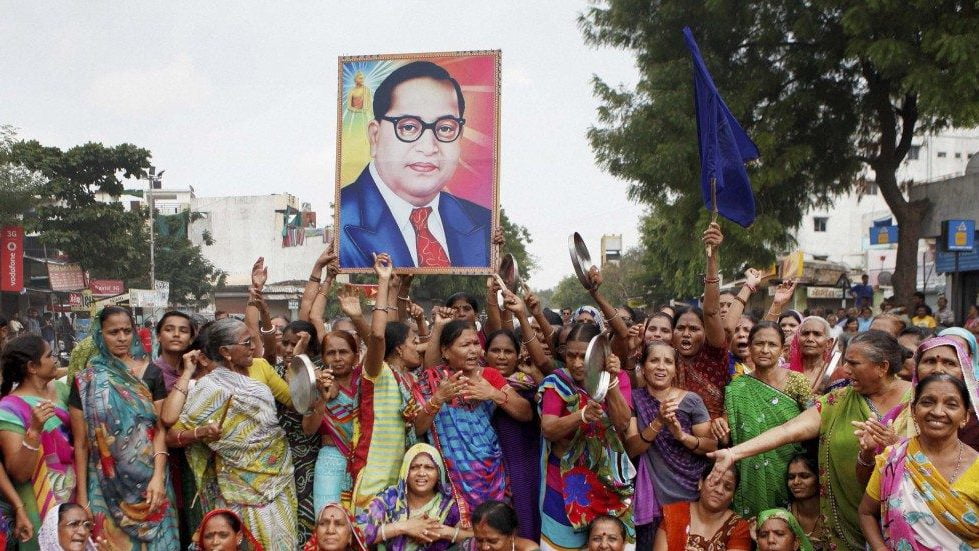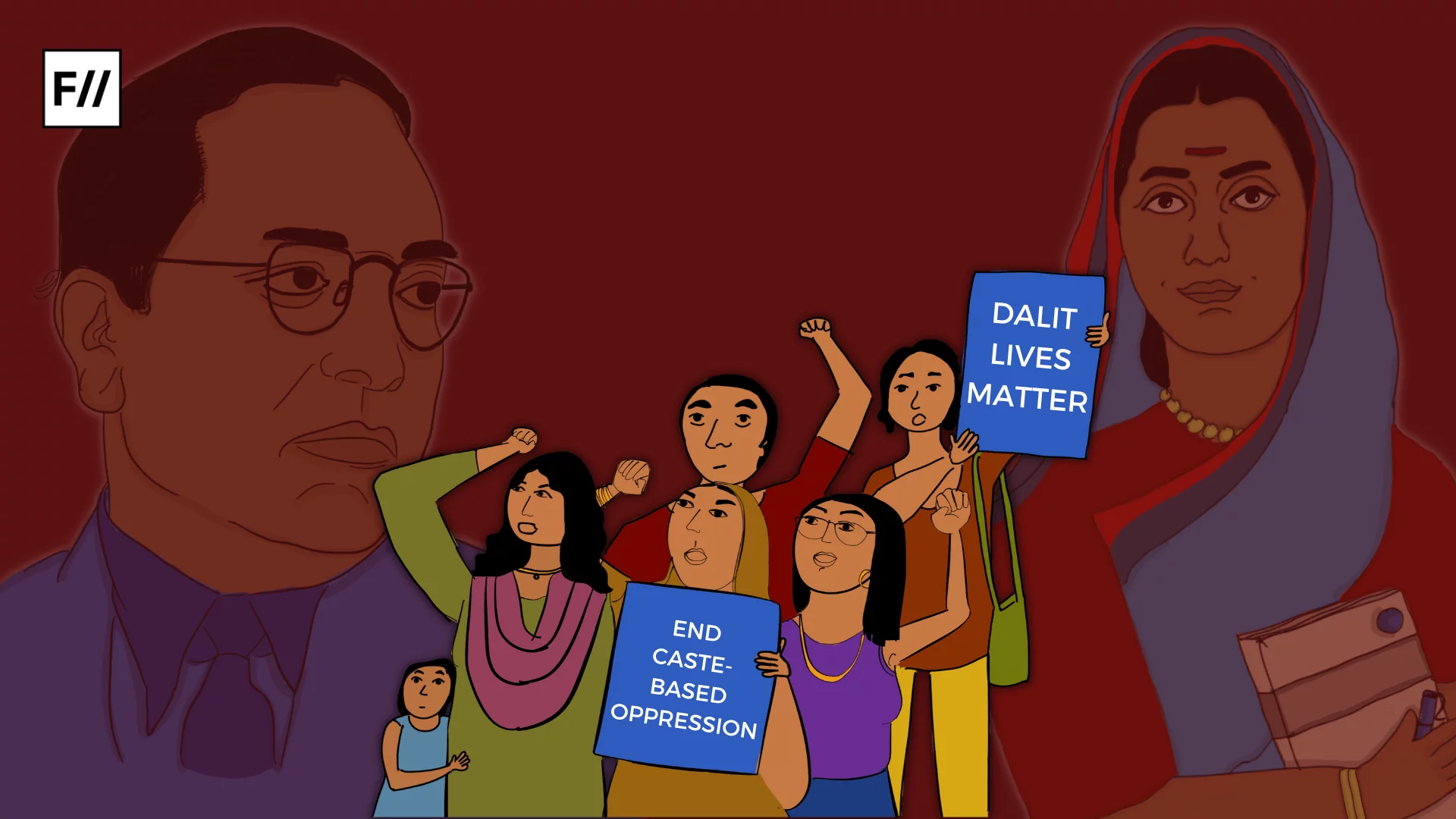Posted by Smriti Bhoker and Deyir Nalo
With the virtue of privilege comes great power, and with that power, comes responsibility. Assuming you are the one with the power, it is not enough to just stand against injustice around you; it is important to focus how you stand up for it. The current regime that gleams on the suffering of minorities has given us a new brand of thinkers and activists, and to understand this phenomenon we have to confront Savarna feminism. As a savarna myself, I will start by apologizing to my marginalized feminist friends who do more towards the cause and get less credit than they deserve. I am sorry. I will make sure we do better.
I’m writing a step by step guide for my savarna clan because I’m tired of this group expecting emotional labor from feminists from the marginalized communities for basic confrontation of one’s power, the same power that should enable us to be better allies instead of creating a carnival for our own cause. As shocking as it is for you my dear savarna feminist, the current feminist movement is way beyond you. So, whenever you’re done moping about that, please read on.
Marginalized Women are not your Feminist Nannies
Savarna feminists like me, know amongst each other that our caste-class superiority enables us to have more access to knowledge and resources. Let’s make it clear for once and for all THEY OWE US NOTHING, THEY NEVER HAVE. This expectation of an explanation when you throw phrases like “oh but how is that classist/casteist?” is frankly exhausting. Spend some time researching before you have the nerve to be offended when Dalit women are writing blogs about your ignorance. I’m urging each one of you to use those resources and learn more about the struggles of marginalized women. We, of all people, shouldn’t have the luxury of blissful ignorance when it comes to intersectionality. Lastly, I’m reminding each one of you to not view marginalized women as your feminist mother/nanny while you are struggling to understand inequality.

Stop Generalizing and Comparing Miseries
Before you get upset about being called out, and block the next Dalit woman for reminding you that Brahminical patriarchy is only called out by upper caste Hindu women when it stops serving or benefiting them, I suggest that you take a long and hard look on how oppression is not a binary and how you don’t have a monopoly on being effected by patriarchy. Remind yourself that even in being oppressed by patriarchy you have a certain amount of privilege. Do this before you find the mortifying strength in your bones that renders you into generalizing people on the basis of mobility, productivity, or the cause and effect of one’s involvement in the current movement. Take a step back and think.
For example, let us look at the case of Vegan Savarnas, who call out people on not making environment friendly choices in their meals. Remember that there is an entire strata which is deprived of the regime of choice in their meals and then there is an economically backward population who are already making environmental friendly choices in their meals without even realizing.
I’m tired of this group expecting emotional labor from feminists from the marginalized communities for basic confrontation of one’s power, the same power that should enable us to be better allies instead of creating a carnival for our own cause.
Positivity Culture is an Expensive Candy Cane
Savarna feminists and capitalism go hand in hand. I’m not here to argue that capitalism is inherently sexist. Instead, what I wish to point out is that Capitalism is only sexist to the women who do not fit its slim, fair, able bodied, English speaking and rich narrative. To paint modern feminism into a bright pink machinery of glitter that asks people to get along and advocates of body positivity (which is exclusive to rich curvy women), and feminist dating styles (which is exclusive to straight cis women), further wrapped up in an entertainment package to be consumed only by the people who can afford it.
Show Up Without Expecting a Penguin Book Deal
I have a joke: show me a national movement that affects the marginalized population and I will show you 5 savarna feminists getting published by speaking over those, whom it is actually affecting. My Savarna feminists are absent from work at grassroots level and only show up when that work is being applauded by the media houses, which I may add is also made up by standards that are meant to please and allow a certain idea of that movement that they think will be more watched. It is a vicious cycle.
Let’s not repeat what white women are doing in the states. Minority voices should never feel undervalued around you and this is not just a feminist responsibility, it is also a moral one.
Every publication I know is cashing in on the vapid flag bearers of a movement, they have offered nothing to. I do not know the source, but few years ago I read that there is no such thing as being the “voice for the voiceless“. Paraphrasing one of my tribal friends, who I’m ever grateful to, who once said that, marginalized women are not voiceless as many upper caste saviors would like to paint them. They have a voice, and time and again they have been loud and clear, even louder than the privileged people could take. By all means, they have been heard by each one of us. It is our unwillingness to do the just thing, after we hear them speak. So pass the mic, get off that stage and stop centering movements around you.

Don’t Use Inclusivity For Tokenism
You know some of you never willingly interacted with anyone outside the deeply vetted and the so called “acceptable” social circle of what you inherited from your parents, and it really shows. It must be hard now, since the feminist movement asks you to get out of your comfort zone which you view as a personal win for yourself. Your marginalized friends are not to be used as a tokenism to sound or seem less racist/sexist and more inclusive. Here’s the thing—anyone’s identity as an oppressed person is not an accessory to your privileged activism. If you have Dalit/Adivasi/Muslim/Trans friends to make a point about yourself then you’re not an ally. You’re penguin book deal waiting to happen.
Remember that there is an entire strata which is deprived of the regime of choice in their meals and then there is an economically backward population who are already making environmental friendly choices in their meals without even realizing.
Listen More
We have to focus on listening more than speaking over minorities. Savarna feminists, hear women around you who do not come from the same social-political standing as you. If you have the time, listen and learn. If you have the money, then donate to the cause by investing in minority run, local businesses, by purchasing their products. Businesses like Paalaguttapalle bags, which is run by Dalit women from the Paalaguttapalle village of Andhra, to sustain their families through drought. Let’s not repeat what white women are doing in the states. Minority voices should never feel undervalued around you and this is not just a feminist responsibility, it is also a moral one.

Stop Acting Like a White Man When They Call You Out
I am yet to see a savarna feminist who takes responsibility of her own lack of awareness and decides to educate herself on the topic, after sensitively apologizing for it. Savarna feminists, you can be wrong; we all are learning. Marginalized feminists OWE US NOTHING not even the calling out part because that too involves a lot unpaid emotional labor and backlash.
Also read: In Conversation With Dalit Camera: Eradicating The Dominant Savarna Lens In Media
Confronting Privilege and Moving On
This brings us to our next step. Quoting my friend Deyir Nalo, who puts it as it is—“You didn’t decide which family to be born into but that doesn’t dissolve the fact that being born into particular caste, race, class or ethnicity has given you some privilege. You may not have asked for it or you may not even be aware of it but you are continuing to profit from it. Like how men regardless of whether they are sexist or not, continue to profit from the privilege of being born a male. That’s how patriarchy works. Not contributing deliberately to oppression isn’t helping anyone you have privilege; it’s time you accept it and use it to add that chair from the across the room for those who have constantly been deprived of sitting in the same table that you simply got born into.” You do not need a suffering story behind you to help the ones who are actually suffering. Do your bit, read and use this power to become more efficient and a more productive ally.
If you have Dalit/Adivasi/Muslim/Trans friends to make a point about yourself then you’re not an ally. You’re penguin book deal waiting to happen.
Stop Looking Down on your Marginalized Friends
Read this loudly and repeat it to yourself—YOUR MARGINALISED FRIENDS ARE NOT YOUR PET PROJECT. They are not simply victims; they are not counting on you to come and save them or speak for them. Abolish this idea of perceiving minorities as the ones you need to save in order to feel good about yourselves.
Also read: The Modern Savarna And The Caste-Is-Dead Narrative
Call out your Savarna circle
All around you, it stinks of misinformation that gloats in its glory of being able to afford toxic and generational supremacy of one’s own class-caste. Your dinner table has racist and casteist uncles. I need you to risk your reputation at home, and do your part in calling out all of them. Educate and guide your younger cousins, your toxic uncles, aunties and parents into being more empathetic and feminist. Let your activism as an ally begin at home.
Smriti Bhoker is pursuing a master’s degree in sociology, Delhi. Deyir is a sociology graduate, Delhi.
Featured Image Source: The Wire
About the author(s)
Smriti Bhoker is a struggling Urdu poet and writer who is studying sociology to understand the simple sexist things in life when she is not procrastinating about her work she is making memes about it. Her biggest ambition in life is to earn a Ph.D. that contributes to the field of feminism while learning as many languages as possible to further complicate her ability to construct a decent sentence at social gatherings.





Hi. Passionate article. Would you elaborate a little on what you mean by “…not view marginalized women as your feminist mother/nanny …”? A bit stumped on the comparison. Would appreciate some clarity. Thanks.
A well written article and to a large extent I agree. But the fact is that privilege exists in many forms eg. Male gender has the benefit of patriarchal society, which the female gender has been fighting for ages. However, a female heir to a conglomerate will be more privileged that an average male. Hence, though gender sensitivity and class/ caste sensitivity is essential, it must be acknowledged that each person is born into / with a set of privileges and may also be subject to his / her own battles eg. A person belonging to a privileged caste may be born in extreme poverty, a child of wealthy parents may be subject to domestic abuse, depression or some other disability. While awareness and education is important, there is no need to be apologetic for being born into a particular family nor is there a need to be overly proud or have a sense of achievement merely due to the accident of birth.
Similarly, I would also like to encourage those from the traditionally oppressed communities who have managed to come out of poverty or have managed to make a name for themselves in society or in their profession to come out and acknowledge that they are now at par with the others in the society. This includes voluntarily giving up several benefits such as reservation in education and jobs. This is not only an encouragement for others in the community in their struggle to achieve equality, but a indication to the `savarna’ that there are at least some people in these communities who acknowledge that they are at par with everyone and can compete as such. Merely saying treat everyone at par will not work, unless the category that feels marginalised stands up and asserts its competence at par. Until this happens, the wedge of `us’ verses `them’ cannot be effectively erased.